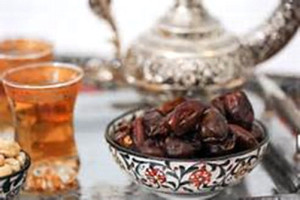Ramadaan with MIAINC
With the Holy month of Ramadaan approaching us, we at MiaInc would like to thank Domestic Divas for allowing us the use of their platform to share with their ardent readers some Ramadaan tips who are trying to remain healthy and practicing self-discipline.
Most people would probably think that with a solid 12 hours without food or water, Muslims everywhere must just be dropping weight madly. Not so, my friends…
Health is the key to happiness, and what we consume directly affects our health. Islam encourages Muslims to ensure that they are mindful of their health. The blessed Prophet (SAW) said: “Take advantage of the good health before illnesses afflict you”. He also encouraged Muslims to try their best to take up a healthy living lifestyle that includes a balanced diet, regular mental and physical exercise and a balance between material and spiritual needs.
The month of Ramadan is a great opportunity to focus on bringing back a balanced and healthy lifestyle in your life. Through fasting you begin to learn how to manage your eating habits, how to improve self-control and discipline. This month requires you to give the stomach a break, and by doing so you are able to break down and expel the accumulated toxins from your body.
I am frequently asked, say’s Zayboonisha Mia Personal Trainer & Instructor; “How can I workout and eat properly while fasting?” Most people see the blessed month of Ramadan as a time when they will lose strength and muscle mass; some think they can only “maintain” themselves during this month, while many women actually gain weight!
Other research has actually shown cardiovascular benefits of fasting during Ramadan – that is, IF you can avoid the IBS. No, that’s not irritable bowel syndrome – it’s the dreaded Iftaar Binging Syndrome! It is vital to eat moderate to small meals even after Iftaar.
Headaches
Many people who fast over Ramadaan suffer mild or moderate headaches as a result of factors such as hypoglycaemia, caffeine withdrawal, addictive substances like nicotine or a change in sleep patterns and the stress of fasting itself.
This is a common problem and has many causes. Headaches during a fast could commonly be due to dehydration or hunger or inadequate rest. The good news is, is that you can manage these headaches without breaking your fast.
Complex Carbohydrates
Carbs are the primary source of fuel used by the body and brain to perform its necessary physical and mental functions. Insufficient carbs in the diet lead to lethargy, weakness, and difficulty concentrating and thinking, as well as low moods and irritability.
These foods help release energy slowly during the long hours of fasting. Complex carbohydrates are found in grains and seeds, like barley, wheat, oats, millets, semolina, beans, lentils, wholemeal flour, basmati rice, etc. Fibre-rich foods are also digested slowly and include bran, cereals, whole wheat, grains and seeds, potatoes with the skin, vegetables such as green beans and almost all fruit, including apricots, prunes, figs, etc.
Water
Always remember to stay hydrated! Drink enough water throughout the evening and during Suhoor to keep your body running at its best.
Dehydration is a common occurrence during a fast. The body continues to lose water and salts through breathing, sweat and urine; the quantity of water loss will vary depending on the weather, how much you had to drink before your fast, the degree of physical exertion and the ability of the kidneys to retain water and salts. Depending on the severity of the dehydration, you may experience a general feeling of being unwell, lethargy, muscle cramps, dizziness, disorientation and even collapse or fainting. If you are unable to stand up due to dizziness, or you are disorientated, you should urgently rehydrate with regular, moderate quantities of water, ideally with sugar and salt, or Lucozade.
Dates
Dates boost your energy while pacifying your hunger, and your body benefits from their health-promoting nutrients. They provide a refreshing burst of much-needed energy at the same time contain insignificant amounts of fat and have no cholesterol.
These are a good source of various vitamins and minerals. Calcium, iron, phosphorus, sodium, potassium, magnesium and zinc can be found in dates. It also contains vitamin K. They also have high levels of soluble fibre, which is essential in promoting healthy bowel movements
Foods to avoid
These are the heavily-processed, fast-burning foods that contain refined carbohydrates in the form of sugar, white flour, etc., as well as, of course, too much fatty food (Eg: cakes, biscuits, chocolates and sweets, such as Indian mithai). It may also be worth avoiding the caffeine content in drinks such as tea, coffee and cola. (Caffeine is a diuretic and stimulates faster water loss through urination.)
Avoid high-fat, high-sugar content, and highly-processed food (e.g. white wheat) – fried food, ghee, samoosas, pies, biryanis…(and the list goes on..!). By Iftaar time, our bodies are working to preserve as much energy possible. Therefore, excessive fatty food and sugars will be rapidly added to body fat reserves.
Salty food at Iftaar and Suhoor will cause dehydration and make you feel increasingly thirsty.
Making exercise during Ramadaan work for you
There is no right or wrong answer. It largely depends on how you feel and how in tune you are with your body.
It’s important to find out what works best for you. You may find that you perform better doing weight training on an empty stomach, or that you feel more energised doing cardio after a light Iftaar meal.
- Do keep workouts short, about 30 minutes to a maximum of 60 minutes.
- Do light cardiovascular exercises – walking or cycling – to help burn calories and improve stamina, full body stretching to improve flexibility and detoxification, or mat exercises such as an ab workout and push-ups.
- Do drink plenty of water between the hours of Iftaar and Suhoor. Drink water with sea salt or coconut water to increase the electrolytes in your body, which are essential for heart, nerve and muscle functions.
- Do not do high intensity exercises like sprinting, stepper or heavy weight lifting (go for lighter than you would normally push) as it can cause joint or muscle injuries and also lead to complications such as low blood pressure, hypoglycaemia and dizziness.
- Do not continue training if you feel weak, dizzy or sick. Although you are training, instead, lower your usual exercise intensity which will be essential to staying fit and healthy.
- Do not eat lots of fried and fatty foods as it will counteract the good work you do at the gym.
We would like to wish all our Muslim readers’ well over the holy month of Ramadaan.
MiaInc – Image Consultants
083 442 3130 / 083 555 2448



